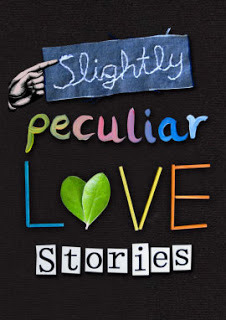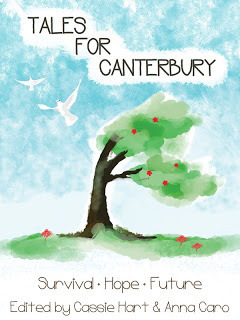Tim Jones's Blog, page 39
August 10, 2011
An Interview With Michael J. Parry
 Michael J. Parry is a librarian by day and an author/father by night. My day job is Digital Initiatives Coordinator for Victoria University Library, where I am in charge of transforming many of our older or copyright held print resources into digital resources. When not there I live on a small block of land outside of Dannevirke where I am growing fruit trees and children.
Michael J. Parry is a librarian by day and an author/father by night. My day job is Digital Initiatives Coordinator for Victoria University Library, where I am in charge of transforming many of our older or copyright held print resources into digital resources. When not there I live on a small block of land outside of Dannevirke where I am growing fruit trees and children. I write fantasy/sci-fi/mystery/contemporary fiction. At the moment I like steam punk and fantasy/mystery and playing humorously with stereotypes. I am interested in writing enjoyable stories and want to be considered a good storyteller.
The Spiral Tattoo is a police procedural with one partner a six-inch-tall male pixie and the other an eight-foot-tall female troll, am I right?
Yes indeed, although the pixie (Gurt) would find that term, and the term fairy, insulting. They call themselves Eleniu and view the other names as big people insults...
Who's the good cop, and who's the bad cop?
Neither really, as they swap around depending on the circumstances. Elanore (the Troll) will play both on the brutish reputation of her race, and her unusual keen intellect to get the most out of the suspect. Otherwise Elanore is good (being honourable and hard working) while Gurt could be bad (being prone to vices and a little lazy)
Is this an idea that you've had for quite some time, or is it one you've developed recently?
The characters are ones I have had for a long time. I have a number of story starts featuring the pairing archived away on my PC. This particular story was just the one that made it to the finish line.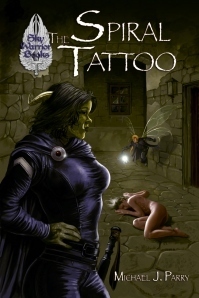
Is this the first novel in a series, and if so, can you give us any clues as to how the series will develop?
It is the first of a series. I am contracted to write two more for my publishers, but have rough story lines for at least five more books. The series is written to be one where you can drop in at any point and pick it up, so it's not a trilogy. They are murder mysteries dressed in a fantasy gown, with more than a little nod to the "cosy mystery" sub-genre. I intend to give small nods in each one to a type of mystery, so the next is a "closed room country house" murder. The one after that is shaping up to be a bit of a "serial killer thriller." I am playing with many of the stereotypes of the fantasy genre so more of the humour will come out there.
I want to turn to the business side of writing. I'll be honest: as an author, it fills me with dread to think of a future in which books sell for 99 cents on Amazon, but that's the sales price of The Spiral Tattoo. Did you think about setting the price point higher, or is 99c the standard price point these days?
The 99c price was set by my publisher. As a price point I don't think it will be a standard for all eBooks, but it is a good entry point for a new author. The idea is to have the first at the low price to entice readers to give the story a go. The later books in the series will be priced higher at the $2.99 mark. It's a little like how gimmicky magazines will have the first issue at a much lower price. Not that I consider the price a gimmick.
How does the economics of selling your book at 99c work out?
For me it works out fairly well. I receive P of the net profits, which means that I would probably be getting more per sale than from a traditional publisher in paperback.
The Spiral Tattoo is published by Sky Warrior Book Publishing – what led you to choose that particular publisher?
I had been hawking off the story to traditional publishers for a while, and was getting to the point where I was reluctantly considering self publishing. Maggie who runs Sky Warrior Publishing put a call out to authors who had podcast their books through podiobooks.com saying she was starting her own publishing house and was looking for new authors. I submitted hoping she had listened to the story and liked it.
How important has social media been to you in promoting your work, and do you have any tips for other writers in that area?
Social media is very important. My publishers have a tiny budget for promotions, so free promotions have to work for both of us. As for tips? Engage, engage, engage, you have to participate actively and not to be afraid to put yourself out there. At the same time you need to make sure not all of your engagement is pushing your work.
What got you interested in writing science fiction and fantasy in the first place, and have you had SF & F at shorter lengths published previously?
Yes well, I am very stereotypical. The first real book I read was The Lord of the Rings and it was all downhill from there. No, I haven't had anything else published. I have always had a large level of self doubt about my writing that has meant I never finished anything. The Spiral Tattoo is the first story I properly finished, and has been a breakthrough for me in terms of my self discipline and self belief.
I see that you write contemporary fiction as well – are you envisaging the same kind of publication path for your contemporary fiction?
My more contemporary stories are on hold at the moment while I concentrate on writing the Elanore and Gurt stories. Depending on what I write and how successfully the current stories are I would look towards using the same path for all my stories.
At the moment, you work as a Digital Initiatives Librarian. Do you plan to become a full-time writer, or are you happy to continue to mix the two?
Isn't that the dream? I would love to be a full time writer, and one day I will. But for now I will struggle along writing and working and dreaming....
Book availability details
The Spiral Tattoo is available in all eBook formats from Smashwords: http://www.smashwords.com/books/view/69496
It is also available in audio form as a free podcast novel from podiobooks.com: http://www.podiobooks.com/title/the-spiral-tattoo
The podcast version is a "beta" or "ARC" version and differs from the print due to the editing process.You can buy books by Tim Jones online! Voyagers: SF Poetry from NZ from Amazon.Transported (short story collection) from Fishpond or New Zealand Books Abroad.
August 8, 2011
Tuesday Poetry News: Eye To The Telescope 2 Published: Robots, Time Machines, Aliens, And Joe Dolce
This isn't, in all conscience, a Tuesday Poem, but it does contain several Tuesday Poets: Issue 2 of Eye To the Telescope, which I edited, has now been published.
Eye To The Telescope is an online magazine recently established by the Science Fiction Poetry Association, and Issue 2 features speculative poetry (that is poetry, in the science fiction, fantasy, horror and associated genres) by Australian and New Zealand poets. The list of contents is:
Editor's Introduction • Tim Jones
If this is the future … • Helen Rickerby
Born Inside Weather • Les Wicks
Another Wow! Signal • Stephen Oliver
then our mother flew unassisted • Raewyn Alexander
Before Science Stepped In • Rod Usher
Rapunzel • Mary Victoria
Bordertown • Grant Stone
A whimper after the bang • Emily Manger
Man in a wingsuit • Chris Lynch
Mechwarrior Sonnet • Toby Davidson
Radio Wave Propagation in the Roman Warm Period • Catherine Fitchett
Nocturne • Peter Friend
mind sings of mer • Sandi Sartorelli
Yayoi Kusama goes to Iceland • Janis Freegard
In the third poem I am being killed by a water lizard • Cy Mathews
Don't Shoot the Robot • David Reiter
The Trouble With Time Machines • Alicia Ponder
Extermiknit • Laurice Gilbert
Dhiy uvenjing goest • Tom Clark
Aliens • Joe Dolce
and you can read the introduction, the poems and the contributor bios (which cover Issue 1 as well as Issue 2). You can also keep an eye out for the submission guidelines for future issues.
Here is the press release I sent out about this issue. I hope you enjoy these twenty poems!
Robots, Time Machines, Aliens, And Joe Dolce
When the Science Fiction Poetry Association asked New Zealand poet, author and anthologist Tim Jones to edit an issue of their online magazine "Eye To The Telescope" featuring Australian New Zealand speculative poetry, he didn't expect to receive a submission from the singer-songwriter behind 1980s hit song "Shaddap You Face" - and he didn't expect to like it enough to include it in the issue, now online at http://www.eyetothetelescope.com/
"Shaddap You Face" was an Italian-themed novelty song that was absolutely inescapable in the early 1980s. 'All I knew of Joe Dolce was that he wrote that one song,' says Tim Jones. 'What I didn't know is that he's also a fine poet, with work published in many of Australia's leading literary journals. His poem "Aliens" makes a great concluding poem for this issue.'
Speculative poetry covers poetry that fits within the science fiction, fantasy and horror genres, plus other associated genres like magic realism and surrealism. 'It was really tough to choose only 20 poems from the much larger number of poems I'd like to have published,' says Tim Jones, 'but I'm happy to have included such a range of genres and styles.'
The first poem, Helen Rickerby's "If this is the future....", uses science fiction as a beautifully delicate metaphor, but there's also such hard-out science fiction poems as Chris Lynch's "Man in a wingsuit". There is apocalyptic menace in Grant Stone's "Bordertown" and Emily Manger's "A whimper after the bang", in contrast to the wry humour of Laurice Gilbert's "Exterminiknit".
'One of the things I'm most pleased about is that this issue brings together well-regarded poets, like Janis Freegard, Stephen Oliver and David Reiter, with authors best known for their fiction, like Mary Victoria and Peter Friend, both of whom contributed poems on fantasy themes, and Spanish-domiciled Australian writer Rod Usher,' Tim Jones commented. 'There's surrealism, a sonnet, and one dialect poem that reminds me of Russell Hoban's great novel "Riddley Walker".'
Whether you love poetry, you love SF, fantasy, and horror, or you just want to find out what on earth speculative poetry is, there is something for you in "Eye To The Telescope 2".You can buy books by Tim Jones online! Voyagers: SF Poetry from NZ from Amazon.Transported (short story collection) from Fishpond or New Zealand Books Abroad.
August 3, 2011
How To Buy My Books: Anarya's Secret, Transported, Voyagers, And More
Welcome! Since I'm between blog posts at the moment, here are details about how to buy some of my books. You'll find my recent posts listed on the left-hand side of this blog.
You can find details of all these books at my Amazon.com author page.
My Earthdawn fantasy novel Anarya's Secret is available from Amazon.com as a Kindle e-book. It is also available from the publishers in hardback, paperback or ebook format.
My short story collection Transported, which was longlisted for the 2008 Frank O'Connor International Short Story Award, is now available for the Kindle.
Voyagers: Science Fiction Poetry from New Zealand, an anthology I co-edited with Mark Pirie, won the 2010 Sir Julius Vogel Award for Best Collected Work. You can buy Voyagers from Amazon.com as a paperback or Kindle e-book, or buy it directly from the publisher at the Voyagers mini-site.
You'll also find my work in these recent anthologies: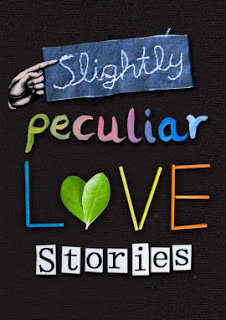
Slightly Peculiar Love Stories is an anthology of 26 love stories by New Zealand and international authors, available as an ebook from Rosa Mira Books, which includes my story "Said Sheree". Isn't the cover great?
Tales For Canterbury is a fundraising anthology from which all proceeds go to the New Zealand Red Cross Christchurch Earthquake Appeal. It has an amazing lineup of authors - Neil Gaiman among them - and I'm delighted that my story "Sign of the Tui", original to this collection, is included.
For a great sampler of NZ science fiction and fantasy, try A Foreign Country: New Zealand Speculative Fiction, which includes my original story "The Last Good Place".
For the cricket fan, or the poetry fan, in your life: A Tingling Catch: A Century of New Zealand Cricket Poems 1864-2009, which includes my poem "Swing".
You can buy books by Tim Jones online! Voyagers: SF Poetry from NZ from Amazon.Transported (short story collection) from Fishpond or New Zealand Books Abroad.
July 26, 2011
An Interview With Barbara Strang
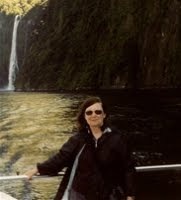 Barbara Strang is a Christchurch poet and haiku writer. She started writing seriously nearly twenty years ago. She was born and brought up in Invercargill, the eldest of ten children. She has three grown up children and one grandchild. She has lived at the base of the Port Hills, Christchurch, for most of her adult life, This area was devastated by the recent earthquakes. Luckily her home by the Estuary is relatively intact.
Barbara Strang is a Christchurch poet and haiku writer. She started writing seriously nearly twenty years ago. She was born and brought up in Invercargill, the eldest of ten children. She has three grown up children and one grandchild. She has lived at the base of the Port Hills, Christchurch, for most of her adult life, This area was devastated by the recent earthquakes. Luckily her home by the Estuary is relatively intact.Barbara's work has been published widely here and overseas, and she has won or co-won four haiku competitions. She has had two collections of poetry published, namely Duck Weather (Poets Group 2006) and The Corrosion Zone (HeadworX 2011). She leads a poetry group called the Airing Cupboard Women Poets, and is an active member of the local haiku community. She has edited and typeset books by other people, including the New Zealand Poetry Society's annual anthologies of 2009 and 2010. She is an editor for Sudden Valley Press, and holds an MA in Creative Writing (Vic).
Barbara's poem Fatigues was my Tuesday Poem this week.
Why did you choose the title The Corrosion Zone for your second collection, and was it a title you'd already chosen before the recent Christchurch earthquakes?
The title was suggested by a LIM report for my new house, which stated it was in the 'corrosion area, within 200 metres of the coast'. It is a reminder that, just as the solid ground on which one stands, can be swept away at any moment, relationships and people we know can crumble and corrode. The cover illustration shows an ancient sea cliff at Godley Head. I had sent the book to the printer just before the earthquake of February struck. I did not know how prescient my title would be.
I'll put the question baldly: what's it like being a Christchurch poet at the moment?
Inside my home I can hardly tell that anything has happened, except for a few new cracks in the wall, and an occasional small or larger tremor. Through the west window I look out on a cliff where the houses are deserted. Out my kitchen window to the south I see where my street goes up the hill. It is blocked by an ominous rock fall, and the houses there are visibly wrecked. My little block has become an enclave of liveable homes in a cul de sac. There aren't many places to go for a walk or shop; almost all the libraries, cinemas, art galleries are closed.
The Port Hills area was one of outstanding beauty, and September here was almost a picnic, but on February 22 it became scary, stressful, uncertain, ugly, tedious and uncomfortable. It was hard to concentrate on anything, including one's writing. But as time has passed I became more accustomed to it. And there is an adrenalin kick in surviving a big one, and the confidence from realising I can actually cope.
I was away for the February one. When June happened I realised that my life was not in much danger. It was just an everyday matter of, initially without power or water, cleaning up, and tapping into my stockpile, literal and figurative. I realised that it was novel and perhaps even a privilege to be part of this thing. For a while I had a new interest, walking around the ruined areas with my camera and notebook. In autumn, instead of writing about fallen leaves, I wrote about fallen houses.
Unfortunately June 13th has made that dangerous, as all the cliffs fell down. The paths and most roads are threatened by rock falls. It is quite depressing to realise that we may not have had the last big quake, and hard to absorb all the change and destruction. I have lost friends who have shifted away; it is difficult for groups to meet. But people have become friendlier, more community minded; and now we have something to talk about. 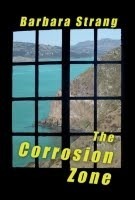
I see that you were born in Invercargill. I spent part of my childhood in Invercargill, and I returned for a literary festival earlier this year. I was struck by how isolated many Invercargill writers feel from the rest of the country. Did that sense of isolation affect you?
I was brought up and educated in Invercargill. My father was a violinist whose day job was in the family firm, coffee and spice merchants. We were brought up on classical music and free jellies. Southland has wonderful wilderness areas like Fiordland and Stewart Island. I am grateful that my dad dragged all ten of us round these and other places in a Kombi van.
As our house was crowded I used to withdraw into my bedroom and read books. I'd look out the window to distant fields, and dream of escape. At age 18 I left for Otago University to study English. Dunedin seemed a huge cultural paradise. There I met my first husband. He and I migrated to Christchurch. My father meanwhile became a violin teacher in Dunedin, the family shifted, and I had no reason to go back to Invercargill. I'd found the smallness of the place stifling, but at the same time I developed a lifelong passion for wilderness and open spaces.
Will those who have read your first collection, Duck Weather, find that there's a big difference between the two collections?
You'd probably guess from the title "Duck Weather" that it was a lot about the natural world and its inhabitants. I think this is my core subject matter. It was quirky and light hearted, though a darker element made an appearance as already there was a strain of depression and suicide in my family. This is another topic which interested me over a long period. I don't think my style is much different in the two books.
And for those who don't know your work, how would you describe your poetry – does it follow a particular style or poetic tradition?
Usually I don't think much about this but I guess I would describe myself as a minimalist writer in the modernist tradition. As a girl I started off with an enthusiasm for Wordsworth and other Romantic poets. Later I discovered New Zealand poetry and was impressed by R A K Mason and Allen Curnow among others, in the green covered Penguin Book of New Zealand Verse. I was struck by the fact that they could use plain conversational language, and wrote about these islands I inhabit.
This seems a long time ago now. Later I was impressed by Yellow Pencils, an anthology of NZ women writers. I was struck by the freshness and honesty of Rachel MacAlpine's work in that book, for instance. There are many other poets whom I admire, to mention a few, Vivienne Plumb, Janet Charman, and David Gregory. These poets may be rather bleak.
I have the mottos "less is more", and "when in doubt cut out". I pare my work down and get rid of frills; I want each little line to resonate. Form develops rather than being imposed. At the same time I am very conscious of the sounds of words, and like to use assonance and half rhymes. I have had little affairs with certain words such as "fall" "hide" and "down", often quite simple ones, which have layers of meaning and a beautiful sound also. I work them hard. The haiku form also has the challenge of making a tiny whole suggest huge spaces, like a Japanese painting.
The poems in The Corrosion Zone work through a lot of grief. Were these especially hard poems to write, or is it all, in the end, just raw material for a poet?
Around the turn of the Millennium I experienced a series of losses. The worst maybe was that our youngest brother Andrew took his own life. He was an intense and artistic person, an inspiration to the rest of us who were artistically inclined. At the same time my husband of thirty years had a midlife crisis and left, and I had to shift from Sumner, the home for goodness knows how long. And a few other things. I found it impossible to write about anything else.
I do not think grief is necessarily negative. It is like winter. It can have its own beauty and even lightness. It may last for years, but hopefully is not the end, as it wasn't for me. I hope that I have avoided the bog and taken the reader safely to solid ground.
I noticed that a lot of your poems use two- and three-line stanzas – forms that I also enjoy using. What draws you to writing in stanzas of this length, and indeed, how do you decide on the length of stanza to use in a poem?
I like them too. I do not usually set out to write these forms but it happens.
You edited the 2009 and 2010 New Zealand Poetry Society anthologies. I know for myself that while editing is very time-consuming, editing other people's work can offer rewarding insights into one's own work. Is this the case for you?
It is a great privilege to edit the work of other poets. I was amazed at the imagination and ability of both experienced and beginner poets, but actually I felt rather overwhelmed too. It made me realise that there are a lot of other ways of writing besides those which I have fallen into.
If it's not a secret, what writing projects are you working on at the moment?
I have a collection of my brother Andrew's poems almost ready for the press, called Things to Know. It is being published by Sudden Valley Press. Apart from that I have been writing some poems about the earthquakes, and living in the present moment. Someone suggested a "Corrosion Zone 2" – but I may have had enough of adverse events!
How to buy The Corrosion Zone
Addenda are the distributors. It is on the shelf at Unity Books, and mentioned on Wheelers.co.nz, Librarything.com, and unibooks.co.nz
It's available to be purchased online from: fishpond.co.nz, ziwi.co.nz, and emporiumbooks.com.au.
The Otago Daily Times review is online - it's the second review on this page: http://www.odt.co.nz/entertainment/books/168183/poetry?page=0%2C1You can buy books by Tim Jones online! Voyagers: SF Poetry from NZ from Amazon.Transported (short story collection) from Fishpond or New Zealand Books Abroad.
July 25, 2011
Tuesday Poem: Fatigues, by Barbara Strang
Often in Dunedin I notice
a tall young man
who looks like you
huddling with his girlfriend
on the damp main street.
He wears a knitted beret
in shades of faded moss
and tangerine
like ancient tartan,
his eyes gleam
in a sallow face
like the lying harbour,
his skin beneath
the wispy beard
glints like Flagstaff granite.
I can't believe you're
not the one haunting these streets
with a new friend
your shoulders hunched
in a greatcoat suitable
for soldiering on mountains.
Credit note: "Fatigues" was first published in JAAM 26 and is included in Barbara Strang's new collection, The Corrosion Zone (HeadworX, 2011).
Tim says: "Fatigues" is one of my favourite poems in Barbara's new collection, and it strikes me as a particularly Dunedin sort of poem, which is always a good thing. Watch out for my interview with Barbara, which will run on my blog in a couple of days.
You can read all the Tuesday Poems on the Tuesday Poem blog - the featured poem is on the centre of the page, and the week's other poems are linked from the right-hand column.You can buy books by Tim Jones online! Voyagers: SF Poetry from NZ from Amazon.Transported (short story collection) from Fishpond or New Zealand Books Abroad.
July 23, 2011
How To Buy My Books: Anarya's Secret, Transported, Voyagers, And More
Welcome! Since I'm between blog posts at the moment, here are details about how to buy some of my books. You'll find my recent posts listed on the left-hand side of this blog.
You can find details of all these books at my Amazon.com author page.
My Earthdawn fantasy novel Anarya's Secret is available from Amazon.com as a Kindle e-book. It is also available from the publishers in hardback, paperback or ebook format.
My short story collection Transported, which was longlisted for the 2008 Frank O'Connor International Short Story Award, is now available for the Kindle.
Voyagers: Science Fiction Poetry from New Zealand, an anthology I co-edited with Mark Pirie, won the 2010 Sir Julius Vogel Award for Best Collected Work. You can buy Voyagers from Amazon.com as a paperback or Kindle e-book, or buy it directly from the publisher at the Voyagers mini-site.
You'll also find my work in these recent anthologies:
Slightly Peculiar Love Stories is an anthology of 26 love stories by New Zealand and international authors, available as an ebook from Rosa Mira Books, which includes my story "Said Sheree". Isn't the cover great?
Tales For Canterbury is a fundraising anthology from which all proceeds go to the New Zealand Red Cross Christchurch Earthquake Appeal. It has an amazing lineup of authors - Neil Gaiman among them - and I'm delighted that my story "Sign of the Tui", original to this collection, is included.
For a great sampler of NZ science fiction and fantasy, try A Foreign Country: New Zealand Speculative Fiction, which includes my original story "The Last Good Place".
For the cricket fan, or the poetry fan, in your life: A Tingling Catch: A Century of New Zealand Cricket Poems 1864-2009, which includes my poem "Swing".
You can buy books by Tim Jones online! Voyagers: SF Poetry from NZ from Amazon.Transported (short story collection) from Fishpond or New Zealand Books Abroad.
July 21, 2011
Poetry Day Post
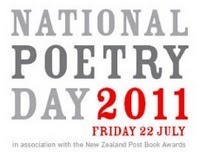
Today is New Zealand Poetry Day. As a Tuesday Poet, I should have put up a post on this theme on Tuesday, but I, er, didn't. (Never explain, never apologise - or wait, isn't that Rupert Murdoch's credo?)
Anyway, I thought I'd use the occasion to direct your attention to the excellent work of those who did. Renee Liang did double duty by both posting a wonderfully phrased poem about Christchurch on her blog, and editing the week's post on the hub Tuesday Poem blog, with poems from the three finalists for the 2011 NZ Post National Book Awards. If if you look in the sidebar to the right, you'll find Poetry Day posts from lots of the Tuesday Poets, with poems and news of poetry events.
I'm embarrassed to say that it's a long time since I have written a poem - what writing time I have had lately has been going into writing short stories - but I've had quite a bit to do with poetry nevertheless.
First, I've selected the poems by Australian and New Zealand poets for inclusion in Eye To The Telescope 2, and should be able to deliver the introduction, poems, and bios for this to the Science Fiction Poetry Association by my self-imposed deadline of 25 July.
Second, planning is proceeding apace for the book tour at the end of October which will launch my collection Men Briefly Explained and Keith Westwater's collection Tongues of Ash, both published by Interactive Press. Once we have all the details settled, we'll start to spread the word about the details of the tour - but, right now, we have venues confirmed in four centres.
In the meantime, enjoy Poetry Day!You can buy books by Tim Jones online! Voyagers: SF Poetry from NZ from Amazon.Transported (short story collection) from Fishpond or New Zealand Books Abroad.
July 20, 2011
Slightly Peculiar Love Stories Is Launched
At 5.30pm Wednesday, New Zealand time, Rosa Mira Books launched Slightly Peculiar Love Stories, an anthology of 26 love stories by New Zealand and international authors, edited by Penelope Todd, and including my tale of love and literary funding, "Said Sheree"*
What a range of authors! They come from Israel, the Philippines, the UK, the USA, Greece, Argentina, and Hong Kong, as well as Aotearoa. Some are internationally well-known; some are well known within their own countries; some are near the start of their literary careers, and some well along in those careers. One is pseudonymous.
I haven't read the anthology yet, but from what I've read about the contributors and their stories on the excellent Rosa Mira Books blog, I expect some of these stories to be slightly peculiar, and some deeply peculiar. Which is appropriate, because that's the way love is.
I'm delighted to be in the company of so many writers I greatly admire. Please raise a glass to Slightly Peculiar Love Stories. Please help it make its way into the world.
*First published in Transported.You can buy books by Tim Jones online! Voyagers: SF Poetry from NZ from Amazon.Transported (short story collection) from Fishpond or New Zealand Books Abroad.
July 13, 2011
Five Questions With Anna Caro, Co-Editor Of "Tales For Canterbury"
Since the Christchurch earthquake of 22 February, editors Cassie Hart and Anna Caro have done an amazing job of pulling together Tales For Canterbury, a fundraising anthology to benefit the victims of the earthquake, with all proceeds going to the New Zealand Red Cross Earthquake Appeal. All the stories have been donated by their authors, and so far, just over half the fundraising target of $5000 has been raised - something you can help with by buying the book as an ebook or paperback.
I asked Anna Caro five questions about Tales for Canterbury, and here are her answers:
1. How soon after the February 22 earthquake did you have the idea for the anthology?
My original answer for this was "pretty quickly - within a few days". Then I went back and checked my emails and found that Cassie emailed me with the idea only a few hours after the quake. Before I'd left work for the day the idea was already taking shape and we were contacting friends and people we'd worked with on other projects.
2. The list of contributors is impressive to say the least - a great range of New Zealand authors, and also such overseas luminaries as Neil Gaiman, Gwyneth Jones, Jay Lake, and someone whose story I'm especially keen to read, Jeff Vandermeer. How did you manage to get so many prominent speculative fiction authors involved in the project?
One of the things putting together Tales for Canterbury made me realise was how far our networks reached. Over the past few years both of us have been building up contacts through editing, events including conventions, involvement in SpecFicNZ and membership of critique groups, and we had a lot of people to call on when we needed them.
Our individual networks didn't quite reach the name's you've mentioned - but we knew people who knew them and were happy to get in touch with them for us. The exception is Neil Gaiman who Cassie (with a bit of encouragement) emailed directly after seeing he made a blog post mentioning the earthquake - his wife was in Christchurch at the time.
3. Tales for Canterbury isn't all speculative fiction, though. Can you tell me about some of the literary and general fiction authors who have work included in this anthology?
Around two thirds of Tales for Canterbury is speculative fiction of some description, but we have some excellent examples of literary or general fiction. Amongst the authors are Kate Mahony, who I first met in an undergraduate class at the IIML, Janis Freegard who lives in Wellington and I knew primarily as a poet and of course yourself (Tim Jones), and subjects range from being a New Zealander overseas, through misfit and eccentric characters to an imagining of life after the earthquake.
I think the fact we imposed only quite broad restrictions on what we were looking for encouraged writers to submit work outside of their usual genre, and several - including Mary Victoria, Philippa Ballantine, and my co-editor, Cassie Hart - who are primarily known for speculative fiction contributed more realistic pieces of work, though the influence of the genre is often apparent. The technology in Mary Victoria's 'Daughter of the Khan', though historically accurate, is perhaps even more frightening and magical to the characters as an alien ship might be to us - and she makes us believe it.
Also worth mentioning here is A.J. Fitzwater's 'My Father, the Tuatara', which I would describe as magical realism, a genre frequently claimed as both speculative and literary fiction. Throughout the story, you're never quite sure whether this is an elaborate metaphor, or a fantastical event, which handled with less skill could be jarring, but here is poignant and thoughtful.
We also have a couple of stories from other genres; I hope there is something everyone will appreciate included.
4. The anthology is divided into three sections - "Survival", "Hope" and "Future". Did you have that division in mind from the start, or did the stories you received naturally fall under those headings?
It came quite early on. We wanted to give the anthology some form of structure, but nothing that excessively limited the stories we included. We played with a few ideas and ended up with this one which mirrored, if in a simplistic way, the stages of a recovery. There were a number of stories that fitted quite naturally under more than one of the headings, and a couple we had to think about a bit before placing them anywhere but I hope the categorisation we ended up with adds something to how readers think about the stories.
5. I know from my own experience how much work goes into co-editing an anthology, let alone publishing it. You've taken an anthology from nothing to completed and published in three months. How on earth did you manage it; have you been able to keep your own writing going during the process; and what lessons have you learned from the experience?
To put it succinctly: with lot of help. I admit we struggled at times but we had so many people helping out behind the scenes, be they our team of volunteer proofreaders, who got through a section each on a very short timeframe, or those who brought us caffeine when we'd been up far too late. There were some circumstances in our favour; in particular, the fact a number of the stories were reprints meant many needed close editing. We also decided early on that the anthology needed to be invitation only; in the past I loved reading work by authors new to me, but in this instance we just weren't able to handle a large slush pile.
I think at times our own writing did suffer for both of us, but within a week of Tales for Canterbury being sent to the printers, both Cassie and myself independently sat down and just wrote, so the damage was definitely temporary - and in any case, I think editing, closely reading other people's work, really does help in the long run.
Lessons? After the previous anthology I edited I had all these bright ideas for improving things, and then when Tales for Canterbury came up I implemented some, but many just got lost in the tight timeframes. So I guess the fact that every project is different would be a lesson. On a personal level, though, I think the biggest lesson I learned was about sharing responsibility. I'm hopeless at delegating, but working with Cassie, who is superbly committed and reliable, and the effects of both having otherwise busy schedules, helped to change that. We passed things back and forth, one picking up when the other was busy, and swapping tasks when things just weren't happening, and having that very positive experience has, I'm sure, taught me a lot about taking a step back and trusting other people to get it right.You can buy books by Tim Jones online! Voyagers: SF Poetry from NZ from Amazon.Transported (short story collection) from Fishpond or New Zealand Books Abroad.
July 11, 2011
Tuesday Poem: This is the way the world ends, by Helen Rickerby
This story is about remembering
and forgetting
Not knowing where you are
or if it's real
But you can die with a martini in your hand
*
The girl in pink, skating towards you
has an automatic weapon
behind her back
and this drug will take you to Jesus
if Jesus is a chorus
line of short-skirt nurses
*
There is too much sun in California
for shadows
*
There are other people
in this story
The bride and groom who laughed themselves to death
the boy who lost hope
the pirate soldier, the man with two souls
the porn stars, the family
the whole city
the whole world
*
This is an apocalypse
in an ice cream truck
*
Twiddling his fingers
While LA burns
'He's going to die,' says one blonde, sadly
'There's nothing we can do,' says the other
as they dance cheek to cheek
hand in manicured hand
There's nothing they can do
Credit note:"This is the way the world ends" was first published in Trout 16 and is reproduced here by permission of the author.
Tim says: Helen Rickerby and I have something more in common than being Wellington members of the Tuesday Poets. We like something that, to many, is a subject to be scorned, feared, or ridiculed. We like Richard Kelly's movie Southland Tales.
Southland Tales, Kelly's followup to Donnie Darko, was a critical and commercial disaster, a great, sprawling, baffling, infuriating mess of a movie that goes nowhere and everywhere at once. The thing is, though, that it is full of the most wonderful images and concepts. It's like someone put Andrei Tarkovsky's soul inside Michael Bay and gave TarkoBay (Baykovsky?) a few mill to go and play with. It's the postmodern "Heart of Darkness". It's nuts. You should see it.
But that's enough about me ... from this raw material, Helen has fashioned another of her marvellous poems inspired by movies.
You can read all the Tuesday Poems on the Tuesday Poem blog - the featured poem is on the centre of the page, and the week's other poems are linked from the right-hand column.You can buy books by Tim Jones online! Voyagers: SF Poetry from NZ from Amazon.Transported (short story collection) from Fishpond or New Zealand Books Abroad.

